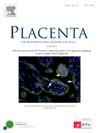Antioxidant treatment attenuates age-related placenta GLUT-1 and PLIN-2 downregulation
IF 3
2区 医学
Q2 DEVELOPMENTAL BIOLOGY
引用次数: 0
Abstract
Background and aim
Pregnancy after the age of 35 is correlated with an increased risk of impaired placentation and the development of pregnancy-associated complications. Changes in uterine redox balance seem to play a role in these settings. In this work, we hypothesized that local redox dysregulation impacts the placenta metabolic profile. Thus, we aimed to study the expression of enzymes/transporters related to nutrient uptake during reproductive aging and the effect of antioxidant supplementation.
Methods
Placenta samples were collected from pregnant women aged between 22 and 41 years, and from mice of different reproductive ages (8–12 and 38–42 weeks). A subgroup of 38–42 weeks-old mice was treated with apocynin (5 mM) in the drinking water. Real-time PCR was carried out to assess gene expression, and immunohistochemistry or western blotting to assess protein expression.
Results
A significant age-related decrease in the expression of glucose transporter type 1 (GLUT-1) was observed in both species. Regarding lipid metabolism, there was a strong negative and significant correlation between the gene expression of fatty-acid transporter type 4 and maternal age, in the human placenta. Perilipin isoform 2 (PLIN-2) decreased significantly with maternal age, in both models. Additionally, a significant age-related decrease in the gene expression of large neutral amino acid transporter type 4 with reproductive age was observed in the mice placenta. Supplementation with apocynin attenuated the observed alterations in GLUT-1 and PLIN-2. The observed changes suggest an age-related placenta metabolic dysfunction, likely associated with oxidative stress, that may negatively impact fetal and placental development.

抗氧化处理可减弱与年龄相关的胎盘GLUT-1和PLIN-2下调
背景和目的35岁以后怀孕与胎盘受损和妊娠相关并发症的发生风险增加相关。子宫氧化还原平衡的变化似乎在这些情况下发挥作用。在这项工作中,我们假设局部氧化还原失调影响胎盘代谢谱。因此,我们旨在研究生殖衰老过程中与营养摄取相关的酶/转运体的表达以及抗氧化剂补充的影响。方法采集22 ~ 41岁孕妇、8 ~ 12周龄和38 ~ 42周龄小鼠胎盘标本。38 ~ 42周龄小鼠亚组饮水中加入5 mM罗布麻素。采用Real-time PCR检测基因表达,免疫组织化学或western blotting检测蛋白表达。结果两种动物中葡萄糖转运蛋白1型(GLUT-1)的表达均与年龄相关。在脂质代谢方面,人胎盘中脂肪酸转运蛋白4型基因表达与母亲年龄之间存在较强的负相关。在两种模型中,Perilipin isoform 2 (PLIN-2)均随母亲年龄的增加而显著降低。此外,在小鼠胎盘中观察到与生殖年龄相关的大中性氨基酸转运蛋白4型基因表达显著下降。补充罗布麻素可以降低观察到的GLUT-1和PLIN-2的变化。观察到的变化提示与年龄相关的胎盘代谢功能障碍,可能与氧化应激有关,这可能对胎儿和胎盘发育产生负面影响。
本文章由计算机程序翻译,如有差异,请以英文原文为准。
求助全文
约1分钟内获得全文
求助全文
来源期刊

Placenta
医学-发育生物学
CiteScore
6.30
自引率
10.50%
发文量
391
审稿时长
78 days
期刊介绍:
Placenta publishes high-quality original articles and invited topical reviews on all aspects of human and animal placentation, and the interactions between the mother, the placenta and fetal development. Topics covered include evolution, development, genetics and epigenetics, stem cells, metabolism, transport, immunology, pathology, pharmacology, cell and molecular biology, and developmental programming. The Editors welcome studies on implantation and the endometrium, comparative placentation, the uterine and umbilical circulations, the relationship between fetal and placental development, clinical aspects of altered placental development or function, the placental membranes, the influence of paternal factors on placental development or function, and the assessment of biomarkers of placental disorders.
 求助内容:
求助内容: 应助结果提醒方式:
应助结果提醒方式:


